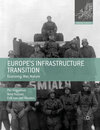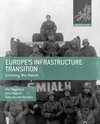
“In Europe’s Infrastructure Transition, Högselius, Kaijser, and van der Vleuten have done an impressive job tracing the symbiotic relations between transportation and communication systems, between system-building and border-building, and between technocracy and nature. The writing is highly readable and the arguments compelling. … This book will therefore likely appeal to academic and non-academic readers alike, and is quite suitable for collegiate classroom use. … this is a thoughtful, engaging, and important book.” (Nicholas Ostrum, CritCom, councilforeuropeanstudies. org, June, 2016)
Europe’s Infrastructure Transition
Economy, War, Nature
von Per Högselius, Arne Kaijser und Erik van der VleutenEurope's infrastructure both united and divided peoples and places via economic systems, crises, and wars. Some used transport, communication, and energy infrastructure to supply food, power, industrial products, credit, and unprecedented wealth; others mobilized infrastructure capacities for waging war on scales hitherto unknown. Europe's natural world was fundamentally transformed; its landscapes, waterscapes, and airscapes turned into infrastructure themselves. Europe's Infrastructure Transition reframes the conflicted story of modern European history by taking material networks as its point of departure. It traces the priorities set and the choices made in constructing transnational infrastructure connections - within and beyond the continent. Moreover, this study introduces an alternative set of historically-key individuals, organizations, and companies in the making of modern Europe and analyzes roads both taken and ignored.






